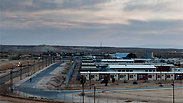
Holot detention facility. 'The dispute between the judges was ideological rather than judicial'
צילום: malin fezehal
Holot ruling marks return of judicial activism
Op-ed: High Court's decision to close detention facility for African infiltrators was determined by composition of panel of judges.
On Tuesday evening, minutes after the Holot ruling was made public, I called a woman who lives near Tel Aviv's central bus station and is active in the struggle for the city's southern neighborhoods, and informed her of the High Court's decision.
She broke into tears. She found it difficult to believe that the law had been rejected again. And as Justice Neal Hendel wrote, the question is "to what extent would it be right to dismiss one group's suffering against another group's suffering."
All the judges spoke about the pain of the residents of southern Tel Aviv and other neighborhoods, but the conclusion most of them reached was different from the one reached by Hendel.
The ruling leaves a bad taste. Not because there isn't anything sensible in it. There is. All the judges have worthy intentions. There is no question about it. The problem is that the dispute between the judges is not judicial. It's an ideological dispute. The composition of the panel of judges points to the outcome.
The discussion focused on the legality of the Entry into Israel Law. The previous version, which allowed the state to send infiltrators to a facility for three years, was rejected. The law was amended so that the detention would be for one year only. the change applied to new infiltrators as well, so that it would be possible to release or ease the one-year detention punishment for humanitarian reasons.
Most of the judges ruled that both clauses of the amendment were unconstitutional. There is something unreasonable in this ruling. Hendel reviews the situation in European countries, where there is an option of detention or arrest for even longer periods. So how can a law be so harmful to human rights to the point of being rejected, when similar arrangements exist in civilized states? And how can a law be so unreasonable or disproportional when not only most Knesset members, but also many legal experts, have clarified that it is constitutional? What does this say about the spectrum of opinions in the court?
The ruling mainly symbolizes a return to the activist approach. Too activist. If we thought we had gotten rid of the punishment of predatory activism, the ruling delivered Monday clarifies that we were wrong. Resigning Interior Minister Gideon Sa'ar, who is a legalist himself and a former intern in the Supreme Court, had irritated his right-wing friends repeatedly when he supported activist decisions. On Monday, he already adopted a different tone.
The blatant criticism against the decision was not produced by the enemies of the rule of law. Supreme Court President Asher Grunis, who remained in a minority as well, is undermining the approach of Justice Uzi Vogelman, who led the minority, as this is a "constitutional stand according to which the court turns into a legislator."
This is an old disease. As US president Abraham Lincoln said, "If the policy of the government upon vital questions affecting the whole people is to be irrevocably fixed by decisions of the Supreme Court, the people will have ceased to be their own rulers."










